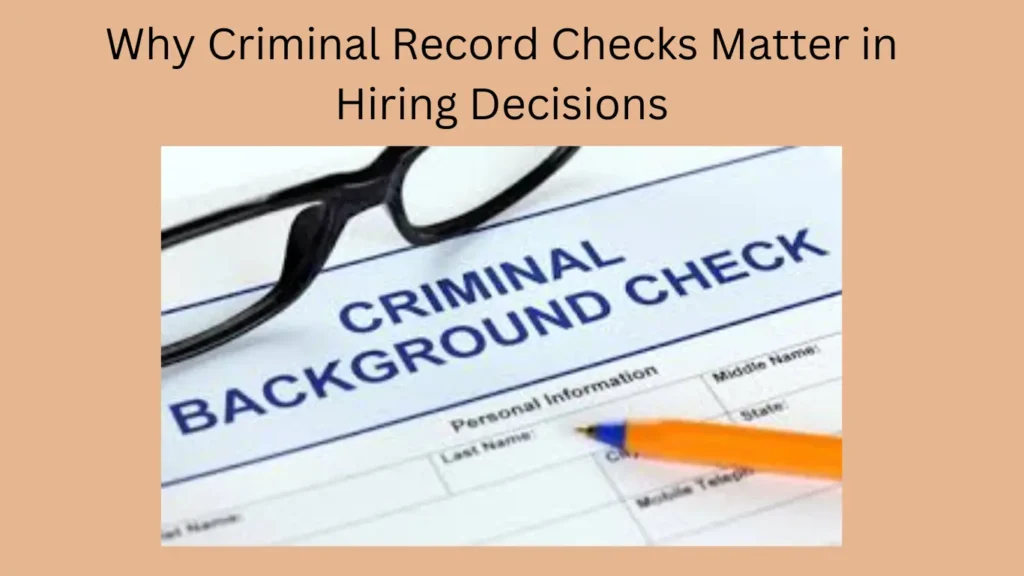Introduction
In today’s competitive job market, ensuring the safety and integrity of your workplace is paramount. Criminal record checks have become a crucial part of the hiring process, helping employers make informed decisions. This guide explores why criminal record checks matter in hiring decisions, how they are conducted, and best practices for using them effectively.
Importance of Criminal Record Checks in Hiring
1. Enhancing Workplace Safety: Criminal record checks help identify individuals with a history of violent or criminal behavior, reducing the risk of harm to other employees and ensuring a safe working environment.
2. Protecting Company Reputation: Employers who conduct thorough background checks demonstrate a commitment to maintaining a trustworthy and reputable organization, which can enhance client and customer confidence.
3. Legal Compliance: Many industries are legally required to perform criminal record checks, especially for positions of trust or those involving vulnerable populations. Ensuring compliance with these regulations helps avoid legal issues and fines.
4. Reducing Turnover Costs: Hiring someone with a criminal background that is relevant to the job can lead to higher turnover rates. Conducting checks helps in selecting candidates who are more likely to stay and perform well.
5. Promoting a Positive Workplace Culture: Knowing that all employees have undergone a thorough vetting process can boost morale and create a sense of security among staff, leading to a more positive and productive workplace culture.
How Criminal Record Checks Are Conducted
1. Obtaining Consent: Before performing a criminal record check, employers must obtain written consent from the candidate, ensuring transparency and compliance with legal requirements.
2. Verifying Identity: Employers should verify the identity of the candidate using government-issued identification to ensure the accuracy of the check.
3. Selecting the Right Type of Check: Different roles may require different levels of checks. Employers can choose from basic, standard, or enhanced criminal record checks depending on the sensitivity and requirements of the position.
4. Using Reputable Background Check Services: Partnering with accredited background check providers ensures the reliability and accuracy of the information obtained.
5. Reviewing the Results: Once the check is complete, employers should carefully review the results, considering the relevance and severity of any criminal records in the context of the job role.
Best Practices for Using Criminal Record Checks
1. Establish a Clear Policy: Develop a clear policy for when and how criminal record checks will be conducted, and ensure it is communicated to all applicants and employees.
2. Ensure Consistency: Apply the same criteria and procedures consistently across similar roles to avoid discrimination and ensure fairness.
3. Provide an Opportunity for Explanation: Allow candidates to explain any criminal records found, considering the context and any rehabilitation efforts made.
4. Keep Information Confidential: Handle criminal record information confidentially, storing it securely and limiting access to authorized personnel only.
5. Regularly Review Policies: Regularly review and update your criminal record check policies to stay compliant with changing laws and best practices.
Conclusion
Criminal record checks are an essential component of the hiring process, contributing to workplace safety, legal compliance, and overall organizational integrity. By understanding their importance and implementing best practices, employers can make informed hiring decisions that benefit both their organization and their employees.
For further Inquires Contact Us
FAQs
1. What is the purpose of criminal record checks in hiring?
- Criminal record checks help ensure workplace safety, protect company reputation, comply with legal requirements, and reduce turnover costs by identifying candidates with relevant criminal backgrounds.
2. Are criminal record checks mandatory for all job roles?
- Not all job roles require criminal record checks, but they are mandatory for positions involving trust, safety, and vulnerable populations, depending on industry regulations.
3. How can employers ensure the accuracy of criminal record checks?
- Employers can ensure accuracy by using reputable background check providers and verifying the candidate’s identity with government-issued identification.
4. Can a candidate explain their criminal record during the hiring process?
- Yes, employers should provide candidates with the opportunity to explain any criminal records found, considering the context and any rehabilitation efforts.
5. How should employers handle the information obtained from criminal record checks?
- Employers should handle criminal record information confidentially, storing it securely and limiting access to authorized personnel only.
